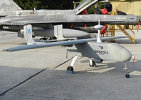Akritas
FULL MEMBER

- Joined
- Feb 1, 2022
- Messages
- 878
- Reaction score
- 0
- Country
- Location
Due to the misinformation that exists regarding the development and purchase UAV and Drones programs on the part of Greece, I am opening this thread, hoping that the whole issue will be sorted out.
I start with the program LOTUS, a next Generation Tactical UAV from INTRACOM DEFENSE for ISR missions and in my opinion is the biggest project as regards the development.
The new European Tactical UAV, specially designed for the effective border surveillance and reconnaissance of threats and high value targets, will be of Hellenic provenance. INTRACOM DEFENSE (IDE) signed with the European Commission, the Grant Agreement for the 9.7 million € funding of the LOTUS – Low Observable Tactical Unmanned System program, approved last July in the framework of EDIDP (European Defense Industrial Development Program).
Lotus program is funding from the European Commision, is not anymore a unique Greek program.
The second major change, is the core of the program, is Intracom Defense and not the Aristotle University of Thessaloniki, who originally started it. The consortium of the LOTUS program includes other industrial, scientific and military entities from Greece, Cyprus, Spain and Netherlands.
The project has the duration of 45 months and started at the summer of 2020.

The LOTUS (Low Observable Tactical Unmanned System) employs a number of innovative characteristics, such as:
The LOTUS program will be based on prior experience and know-how acquired through the collaboration of IDE with key partners in previous RPAS designs, such as:

The consortium of the LOTUS program is coordinated by IDE and comprises of industrial, scientific and military entities from Greece (IDE, Aristotle University of Thessaloniki, ALTUS, CFT, University of Patras and the Hellenic Air Force Telecommunications and Electronics Depot), Cyprus (SignalGenerix, Cyric and Geoimaging), Spain (Embention) and the Netherlands (RHEA Group).
Through its participation in the program, the Hellenic Ministry of Defense (HMoD) will be able to field its respective operational requirements and to achieve its self-sufficiency within a 5-year plan, bypassing the obstacle of non-controlled critical systems. Moreover, HMoD will have the opportunity to acquire a TRPAS, which will fill effectively a confirmed capability gap for the country’s defense.
I start with the program LOTUS, a next Generation Tactical UAV from INTRACOM DEFENSE for ISR missions and in my opinion is the biggest project as regards the development.
The new European Tactical UAV, specially designed for the effective border surveillance and reconnaissance of threats and high value targets, will be of Hellenic provenance. INTRACOM DEFENSE (IDE) signed with the European Commission, the Grant Agreement for the 9.7 million € funding of the LOTUS – Low Observable Tactical Unmanned System program, approved last July in the framework of EDIDP (European Defense Industrial Development Program).
Lotus program is funding from the European Commision, is not anymore a unique Greek program.
The second major change, is the core of the program, is Intracom Defense and not the Aristotle University of Thessaloniki, who originally started it. The consortium of the LOTUS program includes other industrial, scientific and military entities from Greece, Cyprus, Spain and Netherlands.
The project has the duration of 45 months and started at the summer of 2020.
The LOTUS (Low Observable Tactical Unmanned System) employs a number of innovative characteristics, such as:
- Stealth properties, hiding it from enemy forces
- Stand-off operational capabilities
- Airworthiness and interoperability based on NATO standards
- Reliable communications
- Extensive adoption of Artificial Intelligence
- Cybersecurity and Expandability to support additional missions
The LOTUS program will be based on prior experience and know-how acquired through the collaboration of IDE with key partners in previous RPAS designs, such as:
- HCUAV, which has already been flight-tested
- DELAER, which is expected to perform flights next year.
The consortium of the LOTUS program is coordinated by IDE and comprises of industrial, scientific and military entities from Greece (IDE, Aristotle University of Thessaloniki, ALTUS, CFT, University of Patras and the Hellenic Air Force Telecommunications and Electronics Depot), Cyprus (SignalGenerix, Cyric and Geoimaging), Spain (Embention) and the Netherlands (RHEA Group).
Through its participation in the program, the Hellenic Ministry of Defense (HMoD) will be able to field its respective operational requirements and to achieve its self-sufficiency within a 5-year plan, bypassing the obstacle of non-controlled critical systems. Moreover, HMoD will have the opportunity to acquire a TRPAS, which will fill effectively a confirmed capability gap for the country’s defense.




